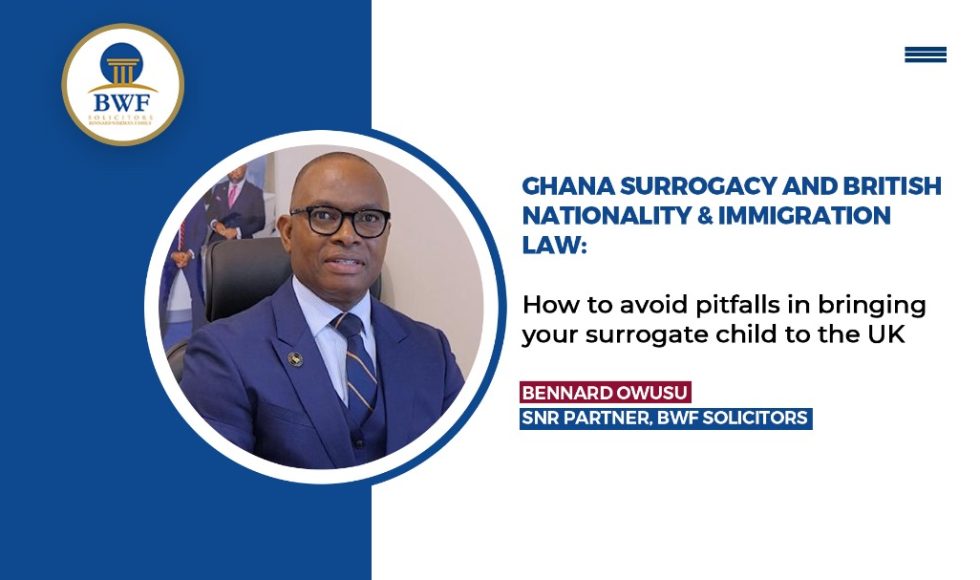How to avoid pitfalls in bringing your surrogate child to the UK
A surrogacy arrangement is the practice whereby a woman carries a child for another person with the intention that the child should be handed over at birth to the commissioning couple or party and raised as theirs.
In England, the key provisions for such arrangements are contained in the:
- Surrogacy Arrangements Act 1985 (SAA 1985)
- Human Fertilisation and Embryology Act 2008 (HFEA 2008)
- Human Fertilisation and Embryology (Parental Orders) Regulations 2010, SI 2010/985 (SI 2010/985), revoked by the Human Fertilisation and Embryology (Parental Orders) Regulations 2018, SI 2018/1412 (SI 2018/1412), and
- Human Fertilisation and Embryology Act 2008 (Remedial) Order 2018, SI 2018/1413 (SI 2018/1413)
The woman who carried the child is known as the ‘surrogate mother’.
The couple with whom she entered into a surrogacy arrangement are the ‘commissioning couple’.
The surrogate mother may be the genetic mother if her own egg was used to create the embryo. This is known as ‘partial’ surrogacy.
In other cases, she may have had a fertilised embryo implanted in her, in which case she will not be genetically related to the child, which is known as ‘host’ or ‘full’ surrogacy.
The commissioning couple may both be the genetic parents, or just one, or neither of them may be genetically related to the child. This will depend on the sources of the egg and sperm used to create the embryo.
In some instances, it may be that both the sperm and the egg were provided by donors, so that the resulting child is not related genetically to either the surrogate mother or the commissioning couple.
Under English law, if neither of the commissioning couple is genetically related to the child, they cannot apply for a parental order.
It is always important to remember that no matter what the genetic make-up of the child, U.K. law sees the woman who carries and bears the child as the legal mother. If she is married at the time of her artificial insemination or the implantation of an embryo, U.K. law will see her husband as the legal father, unless it is shown that he did not consent to the implantation of the embryo or the artificial insemination.
This remains the case even where the surrogate mother is a Ghanaian residing abroad, because the interpretation of the Immigration Rules is in accordance with
U.K. law, and so it is U.K. law that will govern the definitions used.
Only where the surrogate mother is single is there a chance of U.K. law viewing the sperm donor/commissioning male as the legal “father”.
In addition, as part of the consideration for any surrogacy application to the Home Office, the legal definition of parent must be considered. Under UK law, the surrogate or carrying mother is recognised as the legal mother of the children until such time as a parental order is completed. For this reason, prospective applicants must always consider the legal implications of any surrogacy agreement.
General Principle
SAA 1985 provides that in determining whether an arrangement is a surrogacy arrangement made with a view to the child being handed over to, or parental responsibility being met by, any other person, the following considerations apply:
- the circumstances as a whole, and
- whether there is a promise or understanding that any payment will or may be made to the woman or for her benefit in respect of the carrying of any child in pursuance of the arrangement.
A surrogacy arrangement is not enforceable by or against any of the persons making it; however, SAA 1985 expressly applies to such arrangements whether or not they are lawful. In addition, although the payment of reasonable expenses in connection with bearing a child is permitted, a surrogate mother may not enforce an agreement for payment of her expenses.
It is an offence to carry out commercial surrogacy arrangements in the UK. The advertising of surrogacy services is also an offence.
However, in Ghana, surrogacy agreements are binding under the law of contract and other statutes, subject to any applicable exceptions.
The commissioning couple or party may apply for a parental order once the child has been handed over by the surrogate mother in pursuance of a surrogacy arrangement.
When considering an application for a parental order, the court must be satisfied that no money or other benefit has been given or received, although the payment of reasonable expenses in connection with bearing a child is permitted.
There is no statutory definition of ‘reasonable expenses’, and the issue has been the subject of case law. Note that even where a payment is in excess of reasonable expenses, the court may retrospectively approve the payment when considering an application for a parental order.
In Ghana, the surrogate mother is entitled to reasonable compensation. Unfortunately, there are currently no official guidelines for compensation. However, it is generally expected that the intended parents compensate the surrogate for her time, effort, and expenses associated with the surrogacy. These must be captured in the surrogacy agreement in order to avoid future misunderstandings or disputes that may arise during or after the surrogacy.
The law in Ghana is currently silent on whether commercial surrogacy is legal within its jurisdiction. The parties must agree on what the compensation to the Surrogate should be and the mode of payment, among others.
In England, HFEA 2008, s. 54(1) provides that:
On an application for a parental order by two people, (a parental order provides for a child to be treated in law as the child of the applicants if):
- the child has been carried by a woman who is not one of the applicants, as a result of the placing in her of an embryo or sperm and eggs, or her artificial insemination, and
- the gametes of at least one of the applicants were used to bring about the creation of the embryo, and
- the conditions set out in HFEA 2008, ss. 54(2)–54(8), are satisfied.
HFEA 2008, s. 54(2), provides that where the application for a parental order is made by two people, the applicants must be:
- husband and wife
- civil partners of each other, or
- two persons who are living as partners in an enduring family relationship and are not within prohibited degrees of relationship to each other.
HFEA 2008, s. 54A(1), provides that on an application for a parental order by one person, a parental order provides for a child to be treated in law as the child of the applicant if:
- the child has been carried by a woman who is not the applicant, as the result of the placing in her of an embryo or sperm and eggs, or her artificial insemination, and
- the gametes of the applicant were used to bring about the creation of the embryo, and
- the conditions set out in HFEA 2008, ss. 54A(2)–54A(8), are satisfied.
A parental order is essentially declaratory in nature and confers a fundamental status on the applicant(s) and on the child. Parental orders may only be set aside in limited circumstances. See: Effect of a parental order and Duration of parental orders.
Unless the court directs otherwise, the agreement of the carrying mother (and any other person who is a parent of the child but not one of the applicants) is required and should be properly evidenced.
The above requirements may pose challenges to commissioning couples or parents who do not have a genetic connection with the child born out of surrogacy.
The UK Immigration and Nationality Laws apply these requirements in the assessment of applications for British passports or settlements under paragraph 297 of the Immigration Rules.
Ghana
In the year 2020, Surrogacy was regulated under Ghanaian law as a form of assisted reproduction and it is regulated by the Registration of Births and Deaths Act, 2020 (Act 1027).
Act 1027 provides the framework for the registration of Assisted Reproductive Births and Related Matters, which includes surrogacy.
The Ghana Act 1027 defines Surrogacy as: (a) an arrangement where an embryo formed from the egg and sperm of persons other than that of a surrogate mother and her partner or husband is implanted into the surrogate mother; or (b) where a gamete is introduced into a surrogate mother to fertilise the egg of the surrogate mother for the purpose of enabling the surrogate mother to carry the foetus and give birth on behalf of the Intended Parents (i.e., the person who desires to be a parent through surrogacy or any other assisted reproductive birth arrangement).
As can be noted, the English law requirement
Surrogacy agreement is an agreement that sets out all parties expectations throughout the surrogacy and following the birth of a child, including the making of the parental order.
Under the laws of Ghana, an application for a pre-birth Parental Order must be brought before the High Court within twelve (12) weeks of introducing an embryo or gamete into the surrogate mother, and the birth of the child must occur within twenty-eight (28) weeks of the grant of the order by the High Court.
A post-birth parental order or substitute parentage order operates in the form of an adoption proceeding. The application must be lodged with the High Court at least 28 days after the birth of the child but not later than 6 months after the birth of the child.
As surrogacy arrangements are new to Ghana, I have heard of stories where the commissioning couple or parents are not allowed to meet the surrogate or participate in the pre and post birth clinical processes. It is of major concern if the parents are not meeting before the legal process is concluded. At the very least, I expect the lawyers for the surrogate mother and the commissioning parents to discuss the arrangements before any contract is signed to safeguard the welfare of any child and the successful handover of the child.
Essential steps to take in Ghana
- seek legal advice from a lawyer who understands both Ghanaian and UK laws.
- know the surrogate mother (at least the two lawyers must communicate).
- be involved in drafting the surrogacy agreement.
- ensure there is no commercial benefit to the hospital or anyone.
- be involved in all pre and post-natal screening and hospital appointments.
- Be present during the birth of the child.
- Seek both pre and post-birth parental orders (as UK law requires a post-birth parental order).
- Keep records of all steps above.
How do I bring the child to the UK?
If one of the child’s legal parents is British otherwise than by descent, then a child born overseas will be British at birth under Section 2(1) of the BNA 1981 and entitled to a British passport.
If the child is not British, consider whether he or she can be registered as British, by entitlement or at discretion.
Section 3(1) of the British Nationality Act 1981 (‘the Act’) states that:
‘If while a person is a minor, an application is made for his registration as a British citizen, the Secretary of State may, if he thinks fit, cause him to be registered as such a citizen.’
This is known as registration by discretion. The factors guiding the exercise of discretion are set out in the Home Office policy guidance. This sets out the circumstances in which the Home Office will normally exercise discretion in favour of an applicant by granting their application. This is not definitive, and each case must be considered on its merits, taking into account the particular circumstances of the case.
What documents must I provide to bring my child to the UK?
The UKBA Guidance advises that you must provide all of the following documents:
Documents must be in their original form. Those that are not in English must be accompanied by certified translations.
- a) Complete the appropriate application forms online and pay the appropriate fee;
b), the child’s original birth certificate showing his name at birth;
c), evidence from the clinic you commissioned in your surrogacy arrangement confirming your biological involvement in the creation of the child and accredited DNA evidence that one of you is genetically related to the child.
d), where the child has been abandoned, a certificate of abandonment from the authorities previously responsible for the child’s care, or, where the surrogate mother has given up her parental responsibilities for the child, a document attesting to her having given up her rights that is legally valid in her home country;
e), any adoption or guardianship order (where applicable);
f), passport(s) of the commissioning couple or other evidence to show that they have settled status in the United Kingdom, such as a birth certificate, registration certificate, or naturalisation certificate;
g), evidence that the commissioning couple can meet the requirements necessary to obtain a Parental Order under Section 30 of the HFEA and that they intend to apply and have the necessary time to make an application for such an order within six months of the child’s birth. The requirements for a Section 30 Order are stated above.
h), bank statements and an accountant’s letter or pay slips which show the monthly incomings and outgoings of the adoptive parent(s) and details of their accommodation in the United Kingdom.
If the child does not qualify for British citizenship, then an application can be made under the Immigration Rules. Under paragraph 297 at Part 8 of the Immigration Rules, one of the following two subparagraphs—or, more likely, both as alternatives:
(e) one parent is present and settled in the United Kingdom or being admitted on the same occasion for settlement and has had sole responsibility for the child’s upbringing.
(f) one parent or a relative is present and settled in the United Kingdom or being admitted on the same occasion for settlement, and there are serious and compelling family or other considerations that make the exclusion of the child undesirable, and suitable arrangements have been made for the child’s care.
I have outlined some of the more common situations I have dealt with successfully recently in this article. However, if you need tailored legal advice, kindly contact us.
UK: +44 20 8493 7340
GH: +233 55 589 5959
Emergency: +44 77 1276 1884
Eunice: +44 75 3581 3910
Charles: +44 79 4763 6037
Email: admin@bwfsolicitors.com
Bennard Owusu is an accredited member of the Law Society Family Law Accreditation Scheme and a member of the Ghana Bar Association. Family Law Accreditation is a recognised quality standard for family law practitioners in the U.K.







